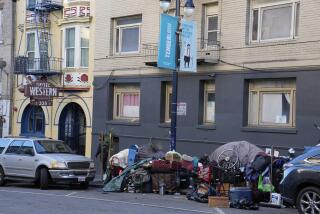Homeless Attend ‘Conference’
- Share via
HONG KONG — Takashi Nishino seemed content, even though he had been sleeping on the streets of Tokyo the last five years and was going back to the same life.
But for a while, at least, he was an international traveler.
After visiting South Korea, Nishino flew to Hong Kong with two other homeless Japanese--Manabu Endo, 55, and Yuji Yamauchi, 50--and a 39-year-old South Korean, Choi Yong-jin. The delegation came to meet with Hong Kong homeless and exchange street-sleeping experiences.
They got a taste of some unique Hong Kong accommodations for the down-on-their-luck. One is a “cubicle room,” which measures less than 32 square feet. The other also puts a roof over their heads, but requires them to sleep behind bars--in what are locally known as “cage homes.”
“Hong Kong’s street-sleepers are pessimistic. But after seeing those in cage homes, I think I’d become like them if I lived there,” said a shocked Endo.
Choi also was unimpressed. “Cage homes look like a jail in North Korea, while cubicles look like storage boxes,” he said.
The recent exchanges of homeless people from three wealthy Asian economies was intended to offer them a look at how their counterparts elsewhere deal with life’s daily challenges.
Sponsors at the Asian Coalition for Housing Rights, a Bangkok, Thailand-based regional network of aid groups for the urban poor, hope that will enable the homeless to cope better with their local conditions.
Maurice Leonhardt, coordinator of the coalition, said several dozen such trips had been held in an attempt to break the isolation of the poor and give them new ideas and strategies for overcoming their plight.
“The enrichment of poor people from one country meeting poor people from another and realizing that they are not alone in this fight--it’s a very emotional experience. That’s a built-in success,” he said.
Hit hard by financial turmoil in 1997, many Asian economies plummeted, forcing widespread layoffs as companies went bust. Many jobless soon became homeless.
In Japan, the latest government estimate, from 1999, put the number of homeless at 20,451, a significant rise from 16,247 a year earlier.
Cho Seong-jun, a South Korean social worker, said street-sleepers in his country soared from 200 in early 1998 to more than 2,000 later that year. The latest Korean government statistics say 6,393 people went through municipal facilities for the homeless in 1999.
In Hong Kong, the number of homeless jumped from 726 in 1998 to around 1,400 this year, the government says.
Poverty in these wealthy economies is not nearly as severe as it is in Asia’s developing nations, but on a personal level it’s painful.
Nishino lost his job as a hotel worker five years ago and began living on the streets. Out of shame, he kept his three older sisters in the dark and lost contact.
Nishino said his trip had revealed stark differences in homeless living conditions.
“It’s easier to find a place in shelter homes in Hong Kong, while the Japanese government doesn’t provide any,” he said. “The church services for the poor are excellent in Korea. They even handed us money.”
Although the visitors didn’t find much to praise in services for Hong Kong’s homeless, they were impressed by the free public shower facilities. A trip to a public bathhouse in Japan costs 400 yen, or about $3.30--a luxury not many homeless can afford frequently.
Still, Nishino said, “The living environment for the homeless here is too harsh.”
Endo, formerly the head of a property company, said Japanese homeless had a strong comradeship in mobilizing themselves to fight for their rights.
He said he feels shame hangs too heavily over Hong Kong’s homeless. “The Hong Kong street-sleepers should be more united. They should share and help each other more,” he said.
A 50-year-old Hong Kong homeless man, who would give only his surname, Wong, said such unity here is unlikely because the homeless are too busy scrapping to stay alive.
Wong said that the homeless in Hong Kong avoid social contact because the public despises them and that the welfare bureaucracy makes it difficult for the poor to benefit from the government’s help.
Last year, Hong Kong set aside $1.1 million for a three-year plan to employ more social workers and provide outreach and retraining services for the homeless.
But Ho Hei-wah, director of the Society for Community Organization, a local social group, said only about half of the city’s homeless manage to get a place in shelters.
“Hong Kong homeless think sleeping on the street is a very humiliating thing,” said Yamauchi, who has been homeless in Osaka, Japan, for four years. “But the Japanese homeless believe it is the failure of the government and its policies that leave us where we are.”
The needy in Japan have yet to benefit from the central government’s $1.6-million package to build temporary shelter for 2,000 people, because communities are reluctant to approve such relief measures in their neighborhoods, said Yoshio Sato, an official at the Labor Ministry. Municipalities would cover half the cost and the national government half.
South Korea’s capital, Seoul, is now largely clear of street-sleepers after the police picked up and housed about 80% of them in more than 160 shelters, where free meals and basic necessities are provided by local churches.
More to Read
Sign up for Essential California
The most important California stories and recommendations in your inbox every morning.
You may occasionally receive promotional content from the Los Angeles Times.













